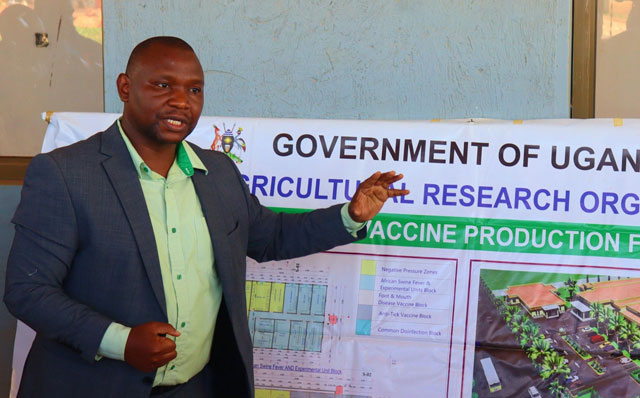
Kampala, Uganda | THE INDEPENDENT | The construction of a sh60-billion anti-tick vaccine production facility at Nakyesasa in Nalukulongo, Wakiso District will be concluded in April 2023, according to the National Agricultural Research Organisation – NARO.
In October 2022, NARO, officially commenced field trials of the anti-tick vaccine dubbed TicVac-U which was developed by Makerere University scientists led by renowned Dr. Margaret Kahwabefore the strain was rolled out to farmers through massive production.
NARO’s Deputy Director General, Dr. Swidiq Mugerwa disclosed to URN in an exclusive interview that ongoing work at the facility will take at least four months before the center commences full-scale production to save livestock farmers from the commercial burden of ticks.
Dr Mugerwa also revealed after such ground-breaking research in the Anti-Tick vaccine, NARO has also made headway into finding a vaccine for Food and Mouth Disease – FMD, and African Swine Fever which will all require production facilities to meet market demands within the East African Community – EAC bloc.
In all tropical African countries except Morocco, Algeria, Libya, Tunisia, and Egypt, as well as South Africa and Namibia, ticks affect the health of humans and animals. Cattle are threatened by ticks and the diseases they transmit, making necessary tick control to avoid endangering the production of this industry.
Dr. Fredrick Kabi, the Principal Investigator for the Anti-Tick Vaccine Project at the National Livestock Resources Research Institute (NaLIRRI) revealed that tick-borne diseases pose a significant threat to the livestock industry in Uganda. Annually, the government spends up to 3.8 trillion Shillings in mitigation measures.
Frank Tumwebaze, Minister of Agriculture, Animal Industry, and Fisheries pointed out that the anti-tick vaccine was rolled out for the final trial stage and passed the tests for the initial stages of prequalification.
It was undertaken at NARO Mbarara ZARDI, Isimba Prison Farm in Masindi district, Kiburara Prison Farm in Ibanda district, Maruzi Research Station in Apac district, and Nabuin ZARDI in Nabilatuk district.
Tumwebaze emphasized that these locations represent the Pastoral Rangelands, Western Highlands, Lake Albert Crescent, Mid-North Savannah Grasslands, and Karomaja Drylands Agro-Ecological Zones respectively.
The anti-tick vaccines were first tested in Australia and Cuba by scientists in 1937 but in Uganda, the development of the vaccine is the first of its kind. In Africa, it is only Kenya and Botswana that produce the FDM vaccine.
In Uganda, livestock farmers are currently spraying their animals every week, but with the vaccine, they will spray twice every 6 months. The injectable vaccine has given promising results against brown, blue, and red ticks.
In January, Members of Parliament on the Public Accounts Committee (Central) queried the delays in the manufacturing of the anti-tick vaccine and foot and mouth disease vaccines by NARO despite funding from the government. The Auditor General’s Report for Financial Year 2020/2021 also queried the same.
*****
URN
 The Independent Uganda: You get the Truth we Pay the Price
The Independent Uganda: You get the Truth we Pay the Price





